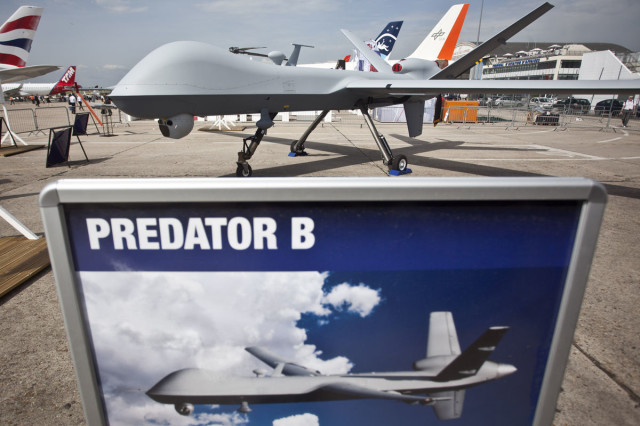Diplomatic tensions between Germany and the U.S. stoked by allegations of spying are spilling over into German government plans to upgrade the military’s UAS, said lawmakers who sit on parliament’s Defence Committee.
Espionage activities that prompted Chancellor Angela Merkel’s government to expel a U.S. intelligence official yesterday compound German concerns over “black box” modules in U.S. bidder General Atomics Aeronautical Systems Inc.’s MQ-9 Reaper, said the lawmakers. That might help tip the balance in favour of awarding the contract to Israel Aerospace Industries’ Heron TP fliers.
“The latest spying allegations raise the hurdle for accepting black box technology,” Hans-Peter Bartels, a lawmaker from Merkel’s Social Democratic coalition partner who chairs the Defense Committee, said in a phone interview. The developments have “stiffened” lawmakers’ resistance to buying the U.S. military hardware, as the expulsion “marks a new low in Germany’s trust in its U.S. ally,” he said.
The snooping spat revives a dilemma for Merkel, who has sought to isolate Germany’s business interests from government pressure on the U.S. to change its intelligence policy since Edward Snowden’s revelations last year. It also threatens to undermine Merkel’s support for a free-trade accord between the U.S. and the European Union.
‘Political Mood’
San Diego-based General Atomics is bidding with RUAG Aerospace Services GmbH in Oberpfaffenhofen, Bavaria, and Elektroniksystem- und Logistik GmbH in Munich, according to a letter dated Jan. 29 from the U.S. company to the Defense Committee obtained by Bloomberg News.
Lawmaker concerns center on what they say is the use of black box technology to store and transmit secure surveillance data to the U.S.
The “political mood is not very positive” toward replacing UAS supplied by the U.S.-based company, Rainer Arnold, the Social Democratic Party’s defence spokesman, said in a phone interview. “Black boxes are not helpful at this juncture, a factor we lawmakers must bear in mind,” he said.
“Naturally, we’re sensitive to the black box issue,” Bernd Siebert, a committee member from Merkel’s Christian Democratic Union party, said in an e-mailed reply to questions. This “will flow into the decision making” on the drone selected, he said.
Exclusive Property
Surveillance information collected by the aircraft remains the property of the German government exclusively, Christopher Ames, director of international strategic development for General Atomics, said in an e-mailed statement. Ames declined to comment on the status of the transaction, referring those questions to the German government.
Spokesmen for both German companies didn’t reply to phone calls and e-mails seeking comment yesterday.
Airbus Group (AIR) is bidding with leasable Heron TP UAS bought from Tel Aviv-based IAI. The TP version, unlike the Heron-1 which is still in service with the German military, can be armed. The army has “good experience” with the Heron-1 and training soldiers to operate the upgrade, which can carry weapons, could take place in Israel and not in more distant Arizona, Arnold said.
“Mission-planning and operation of the system is — in contrast to the American model — not dependent on, able to be influenced or controlled by third parties,” ARD Television reported on July 1, quoting from an Airbus letter to the Defense Committee.
‘Trusting Cooperation’
Merkel, speaking in China on July 7, said that the arrest of a 31-year-old German secret service employee on suspicion of spying for the U.S. is a “serious case” that, if true, violates “trusting cooperation” between allies. Germany’s Federal Prosecutor confirmed a second investigation into espionage linked to the Defence Ministry two days ago.
While German politicians may be “utilizing” the spying scandals, their concerns betray long-standing attempts to free Europe from dependency on U.S. technology, said Jan Techau, who heads the Brussels office of the Carnegie Endowment. As such, the dispute over black box technology is a symptom of anxiety over the “entire” U.S. domination of the data technology industry, Techau said in a telephone interview.

